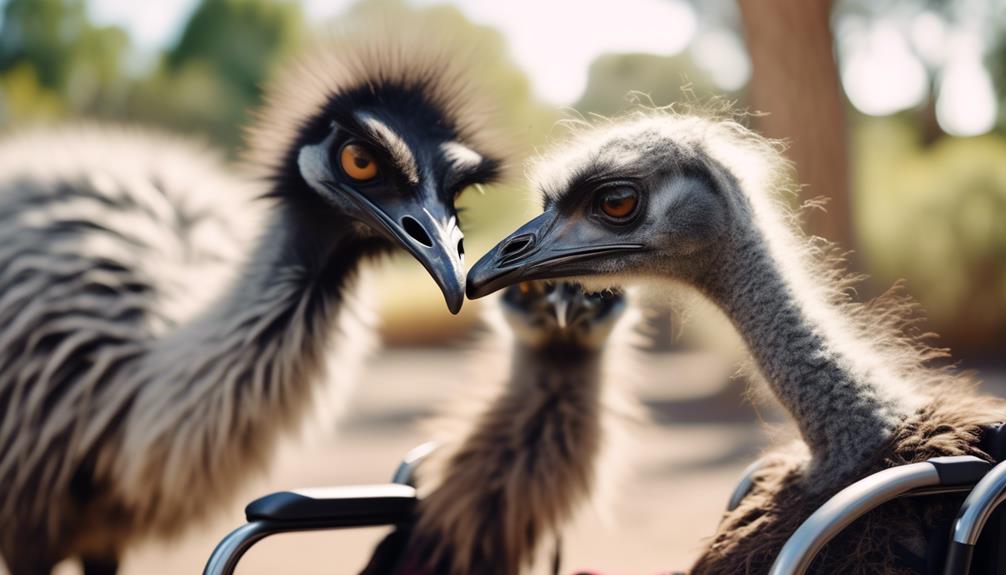
Have you ever wondered if emus could potentially be used as service animals?
With their unique traits and adaptability, there is a theory that suggests emus might have the potential to assist individuals with disabilities. But is this theory grounded in reality?
In this discussion, we will explore the potential and possibilities of emus as service animals, uncovering their unique traits, the benefits they may provide, the training requirements involved, and the legal considerations to be taken into account.
Join us as we delve into the world of emus and their potential to make a difference in the lives of individuals in need.
Key Takeaways
- Emus have the potential to provide emotional support and therapy due to their calm and gentle nature.
- Emus offer unique traits and abilities that make them well-suited for assistance, including their size, strength, and keen sense of observation.
- Emus require training in basic obedience, socialization, and task-specific skills, with positive reinforcement being a key method.
- Emus demonstrate adaptability to diverse environments, making them suitable for various settings, including urban areas.
Emus as Alternative Service Animals

Emus can be considered as alternative service animals due to their unique characteristics and capabilities. While dogs are commonly used as service animals, emus have shown potential in the field of emotional support and therapy. These large flightless birds possess qualities that make them suitable for providing comfort and assistance to individuals in need.
Emus are known for their calm and gentle nature, which can be beneficial for individuals seeking emotional support. Their presence alone can help alleviate anxiety, stress, and depression. Moreover, emus have been observed to have a calming effect on people, allowing them to feel more at ease in challenging situations.
In therapy sessions, emus can assist therapists in creating a safe and comfortable environment for their clients. The non-judgmental nature of these birds can make individuals feel more accepted and understood. Additionally, their large size and soft feathers provide a tactile and sensory experience that can promote relaxation and emotional healing.
It is important to note that emus, like any other service animal, require proper training and guidance to fulfill their role effectively. Their unique needs and behaviors must be understood and respected to ensure their well-being and the well-being of those they're assisting.
Unique Traits of Emus for Assistance
With their unique physical attributes and behavioral characteristics, emus possess a range of traits that make them well-suited for providing assistance to individuals in need. Emus' unique qualities contribute to their suitability as service animals, offering a distinctive and effective form of support.
One of the most notable traits of emus is their impressive size. Standing at an average height of six feet, they're larger than traditional service animals such as dogs or miniature horses. This size advantage allows emus to provide a heightened sense of security and physical support to their handlers, especially those with mobility impairments.
Furthermore, emus' strong legs and powerful stride enable them to traverse various terrains effortlessly. Their long legs not only provide stability but also allow them to cover larger distances, making them ideal companions for individuals who require assistance with walking or navigating outdoor environments.
Emus also possess a keen sense of observation, which enables them to detect changes in their surroundings and alert their handlers. This heightened awareness proves invaluable to individuals with hearing or visual impairments, as emus can serve as reliable guides and assist in avoiding potential hazards.
In addition to their physical attributes, emus' calm and gentle nature make them well-suited for emotional support. These birds have been observed to exhibit a nurturing behavior towards their handlers, providing comfort and companionship during times of distress.
Benefits of Emus as Service Animals

Emus' unique abilities and characteristics offer a range of benefits that make them highly effective service animals. These benefits include:
- Emus as Therapy Animals
- Emus have a calming presence that can help reduce anxiety and stress levels in individuals. Their gentle nature and non-judgmental behavior create a safe and comforting environment.
- The rhythmic movement of an emu's gait can be soothing and therapeutic, providing a sense of stability and grounding for those with balance or mobility issues.
- Emotional Support Emus
- Emus possess a natural ability to empathize with human emotions. They can sense and respond to subtle changes in mood, providing comfort and companionship to those in need.
- The physical act of stroking an emu's soft feathers can release endorphins and promote feelings of relaxation and well-being. This tactile interaction can be particularly helpful for individuals with sensory processing disorders.
The benefits of emus as service animals extend beyond their physical attributes. They offer a unique connection that fosters emotional support and enhances overall well-being. Whether it's providing therapy or offering comfort, emus have the potential to make a significant impact in the lives of those they assist.
Their presence can bring a sense of calm and joy, creating a bond that goes beyond words. Emus truly have the potential to be remarkable service animals, offering a new and innovative approach to therapy and emotional support.
Training Requirements for Emus
After understanding the benefits that emus provide as service animals, it is important to explore the training requirements necessary for these unique creatures. Emu training methods involve a combination of positive reinforcement and behavior analysis to ensure their successful integration into service animal roles.
Emus, like any other service animal, require specific training to perform their duties effectively. This includes basic obedience training, socialization, and task-specific training. Emus have a natural curiosity and intelligence, making them quick learners. However, their large size and strong instincts can present challenges in the training process.
To address these challenges, emu training methods focus on positive reinforcement. This involves rewarding desired behaviors with treats, praise, or other rewards, while ignoring or redirecting unwanted behaviors. Emus respond well to this approach and can quickly learn to perform tasks such as opening doors, retrieving objects, or providing emotional support.
In addition to positive reinforcement, behavior analysis plays a crucial role in emu training. Understanding and analyzing their behavior helps trainers identify potential triggers and develop strategies to address them. By observing and interpreting their body language, trainers can better understand their emotions and needs, ensuring their well-being and success as service animals.
Table: Emu Training Methods
| Training Method | Description |
|---|---|
| Positive Reinforcement | Rewarding desired behaviors with treats, praise, or other rewards, while ignoring unwanted behaviors. |
| Behavior Analysis | Analyzing emu behavior to understand emotions, needs, and potential triggers. |
Emus have the potential to be exceptional service animals, and with the right training methods and behavior analysis, they can fulfill their roles effectively and provide valuable support to those in need.
Emus' Adaptability to Different Environments

Emus demonstrate remarkable adaptability to diverse environments, making them well-suited for a variety of service animal roles. Whether it's hot and arid deserts or cold and snowy regions, emus have proven their ability to thrive in different climates. These remarkable birds have evolved to withstand extreme temperatures, relying on their unique physiological features to regulate their body temperature. With their dense feathers and oil glands, emus can stay warm in freezing temperatures and cool in scorching heat. This adaptability makes them an ideal choice for service animal roles in various climates.
Additionally, emus have shown their adaptability to urban environments. Unlike some other animals, emus can navigate through busy streets and crowded spaces with ease. Their slender bodies and long legs enable them to maneuver through tight spaces, making them well-suited for urban settings. Emus have the ability to remain calm amidst the hustle and bustle of city life, making them excellent companions for individuals who require service animals in urban environments.
Emus' adaptability to different climates and their ease of navigation in urban environments make them versatile service animals. Their ability to thrive in various conditions allows them to assist individuals in a wide range of settings, providing comfort, companionship, and support.
Legal Considerations for Emus as Service Animals
When considering emus as service animals, it is important to understand the legal considerations surrounding their use and the rights of individuals who rely on them for assistance. Emus, like other service animals, are protected under the Americans with Disabilities Act (ADA). This federal law ensures that individuals with disabilities have the right to be accompanied by their service animals in public spaces, such as restaurants, stores, and transportation vehicles.
The ADA defines a service animal as a dog that is trained to perform tasks that mitigate the effects of a person's disability. However, the ADA does not specifically mention emus or any other species as service animals. This means that the use of emus as service animals may be subject to additional scrutiny and evaluation on a case-by-case basis.
When it comes to emus in public spaces, it is important to consider the individual's disability and the specific tasks that the emu is trained to perform. The ADA requires that service animals be under control and that they do not pose a direct threat to the health or safety of others. This means that emus must be well-behaved, properly trained, and not cause any disruption or harm to the environment or those around them.
In summary, while emus are not specifically mentioned in the ADA, their use as service animals is possible. However, it is crucial to adhere to the guidelines set forth by the ADA to ensure the rights of individuals with disabilities and the safety of everyone involved.
| Legal Considerations for Emus as Service Animals |
|---|
| Emus in Public Spaces |
| Emus and the Americans with Disabilities Act |
Emus' Potential in Assisting Individuals With Disabilities

Emus have shown promise in their ability to assist individuals with disabilities through their unique skills and attributes. These majestic creatures have the potential to make a significant impact on the mental health and well-being of those in need. Here are a few ways in which emus can contribute to the lives of individuals with disabilities:
- Emus' impact on mental health:
- Emus have a calming presence that can help reduce anxiety and stress levels.
- Interacting with emus can promote a sense of emotional stability and provide comfort during difficult times.
- Emus' role in social integration:
- Emus can serve as social catalysts, facilitating interactions between individuals with disabilities and others.
- The presence of emus can help break down barriers and promote inclusion within communities.
Emus have a unique ability to connect with individuals on an emotional level and provide a sense of companionship. Their non-judgmental nature and gentle demeanor can create a safe space for individuals with disabilities to express themselves freely.
Exploring the Future Possibilities of Emus as Service Animals
To explore the future possibilities of emus as service animals, it's important to consider their unique attributes and potential benefits for individuals with disabilities. Emus possess several qualities that make them suitable candidates for assisting people with various impairments. They're large, strong birds capable of carrying heavy loads, which could be advantageous for individuals with mobility limitations. Emus are also highly intelligent and trainable, allowing them to learn and perform tasks that can enhance the independence and well-being of their handlers.
In addition to these attributes, there are future challenges and research opportunities that need to be addressed in order to fully understand and harness the potential of emus as service animals. These include:
- Legal and ethical considerations: Establishing guidelines and regulations to ensure the welfare and safety of both the emus and the individuals they assist.
- Training and certification: Developing standardized training programs and certification processes to ensure that emus are properly trained and capable of meeting the specific needs of individuals with disabilities.
- Public awareness and acceptance: Educating the public about the benefits and capabilities of emus as service animals to promote acceptance and inclusivity.
Frequently Asked Questions
Are Emus Commonly Used as Service Animals?
Emus are not commonly used as service animals. However, their behavior and characteristics make them suitable candidates for therapy work. Emus have shown potential in providing emotional support and companionship to individuals in need.
What Are the Legal Restrictions for Having an Emu as a Service Animal?
Legal restrictions for having an emu as an emotional support service animal may vary. It is important to research and understand the specific laws and regulations in your area to ensure compliance and the well-being of both you and the emu.
How Do Emus Compare to Traditional Service Animals in Terms of Training Requirements?
Compared to traditional service animals, emus have unique training requirements. While both require patience and consistency, emus' size and strength make their training process more challenging, but also more rewarding.
Can Emus Be Trained to Assist Individuals With Specific Disabilities, Such as Visual Impairments or Mobility Limitations?
Yes, emus can be trained to assist individuals with specific disabilities such as visual impairments or mobility limitations. However, there may be potential challenges or limitations when using emus as service animals.
What Are the Potential Challenges or Limitations of Using Emus as Service Animals?
When considering emus as service animals, it's important to be aware of potential challenges and limitations. These may include training requirements, legal restrictions, and the specific disabilities that emus may not be able to assist with effectively.
Conclusion
In conclusion, emus have the potential to serve as alternative service animals due to their unique traits and adaptability. Their benefits include their size, strength, and ability to provide emotional support.
However, training requirements and legal considerations must be taken into account. Emus are not currently recognized as service animals, so there may be challenges in terms of gaining public acceptance and legal recognition. Additionally, emus require specialized training and care to ensure their safety and the safety of those around them.
Despite these challenges, emus have the potential to greatly assist individuals with disabilities. Their large size and strength make them suitable for tasks such as mobility assistance, and their calm and gentle nature can provide emotional support. Emus also have a long lifespan, which means they can provide long-term assistance to their handlers.
Further research should be conducted to explore the possibilities of using emus as service animals. This research could include assessing their temperament, training methods, and the legal and ethical implications of using them in this role. By gaining a better understanding of emus and their capabilities, we can determine if they are a viable option for individuals who require service animals.





